Geographers Diana Liverman and Sallie Marston Honored in Women's Plaza of Honor
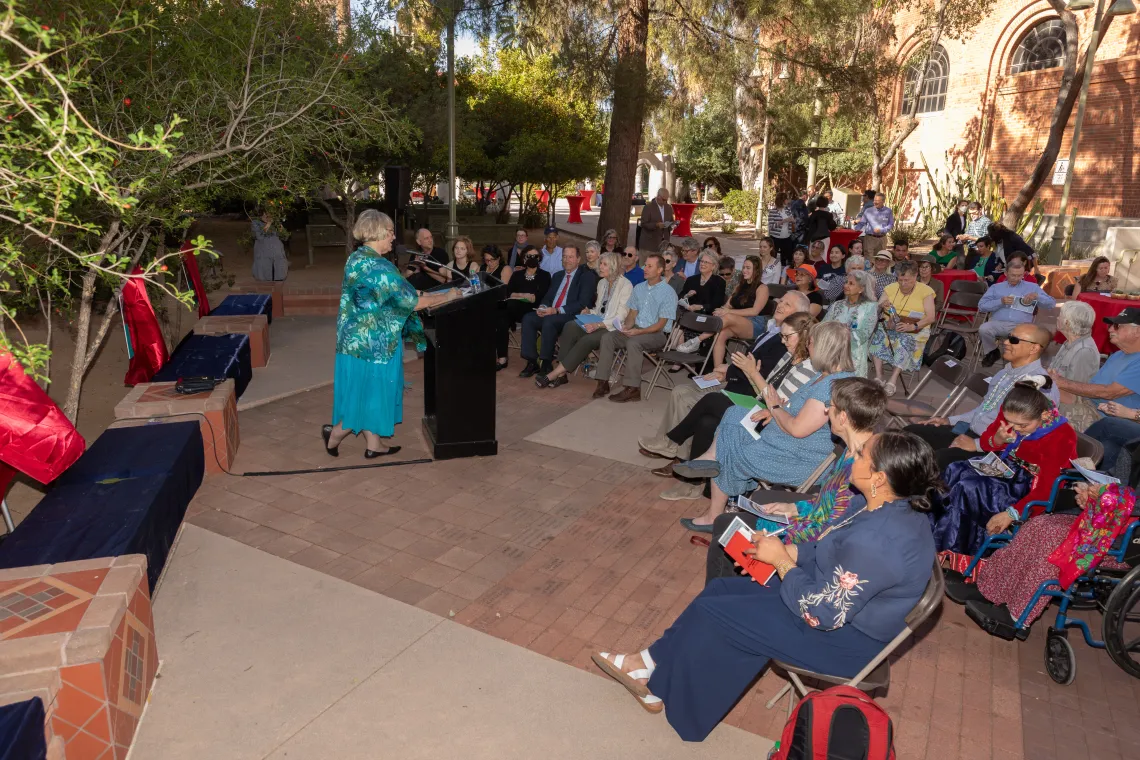
Mary Grier, Haury Program Donor Advised Fund Board Chair, emceed the event "Weaving Beautiful Lives: A Tribute to Four Inspirational Women." Photo by Chris Richards/Arizona Alumni Association.
University of Arizona geographers Diana Liverman and Sallie Marston – along with Professors Karletta Chief and Toni Massaro – have been recognized in the Women’s Plaza of Honor.
At the April 11, 2022 event, Weaving Beautiful Lives: A Tribute to Four Inspirational Women, the honorees were awarded a personalized bench in the Plaza for their individual and collective leadership and scholarship and for inspiring new perspectives and actions throughout their disciplines and communities.
The Women’s Plaza of Honor is sponsored by the Women’s Studies Advisory Council in the UArizona Department of Gender & Women’s Studies. With names inscribed in its garden pathway, sweeping arches, tiles, and brick paths, the Plaza publicly and permanently celebrates women who have made significant and enriching contributions to the history of Arizona and the lives of its residents.
Mackenzie Meitner, graphic designer in the College of Social and Behavioral Sciences, worked with Liverman and Marston to personalize their benches with quotes and imagery meaningful to their lives.
The benches were bestowed by the Agnese Nelms Haury Program in Environment and Social Justice in the Arizona Institute for Resilient Environments and Societies, or AIRES, the College of Social and Behavioral Sciences, the Department of Environmental Science, and the James E. Rogers College of Law.
Mary Grier, Haury Program Donor Advised Fund Board Chair, noted that all four women have played a significant role in the Agnese Nelms Haury Program in Environment and Social Justice, either by “carrying out one of our seminal projects or, in the case of Dr. Liverman and Dean Massaro, helping us conceive of the program.”
“These four amazing women have provided the warp and weft around which many other lives have grown and blossomed, connecting university and community, and students and faculty, as symbolized by the community weaving project,” said Grier, referencing a community art project that incorporates messages to the honorees, slated to be installed in ENR2.
Diana Liverman, Trailblazing Scholar and Mentor
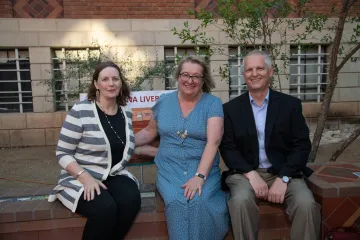
Margaret Wilder, Diana Liverman, and Andrew Comrie. Photo by Darcie Elliott, UAHS Biocommunications.
Diana Liverman, Regents Professor in the School of Geography, Development & Environment, or SGDE, was one of the first scholars to address the human dimensions of global environmental change.
Liverman has received many prestigious recognitions, including the Founder’s Medal from the Royal Geographical Society and election into the U.S. National Academy of Sciences and the American Association for the Advancement of Science. She has contributed to major international climate reports, advised President Clinton, and conferred with the Dalai Lama on climate change.
“Diana’s research and teaching has blazed a trail, making the case for paying keen attention to climate vulnerability and the need for societies to adapt in a globally equitable manner,” said Margaret Wilder, interim director of the School of Geography, Development & Environment and Liverman’s first Ph.D. advisee at UArizona.
Andrew Comrie, chief academic officer for the Arizona Board of Regents and former director of SGDE, said Liverman was instrumental in advancing the role of social science in the climate change discussion.
“We wouldn't have all these climate reports that talk about the impacts of climate change and what we can do about it if it wasn't for Diana and her colleagues at the time,” Comrie said.
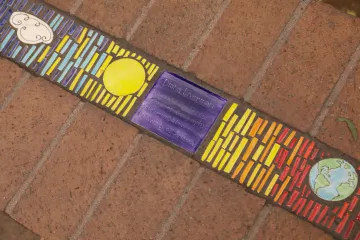
A segment of Diana Liverman’s bench showing climate stripes going from blue to red, reflecting increasing temperature. Her bench also includes desert “critters,” an Australian shepherd to reflect Liverman’s beloved dog, and quotes from Mary Robinson, Nelson Mandela, and Rachel Carson.
Liverman is also dedicated to supporting fellow women climate scientists.
“Diana has elevated the visibility of women climate scientists through her own persona and expertise, through her scholarship on women in climate science, and through her mentorship of almost 50 women graduate students, 20 of whom were Ph.D.s,” Wilder said.
“But beyond her intellectual contributions and leadership, Diana is first and foremost an amazing colleague, mentor, and friend who cares deeply about her junior colleagues and her students, brings them into her life, and often offers food and shelter under her roof,” Wilder said.
Comrie added, “It’s something of an axiom in our discipline that Diana may be the most network individual out there. Her ability to connect people is something quite amazing.”
“Sharing the WPOH space with so many amazing women connected to the University of Arizona is a great honor, especially with my ‘bench sisters’ Sallie Marston, Karletta Chief and Toni Massaro, fierce supporters of social and environmental justice,” Liverman said.
Sallie Marston, Community Activist and Academic “Rockstar”
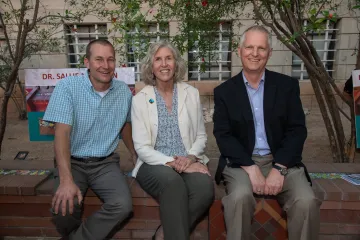
Moses Thompson, Sallie Marston, and Andrew Comrie. Photo by Darcie Elliott, Elliott UAHS Biocommunications.
Sallie Marston, Regents Professor Emerita in the School of Geography, Development & Environment, investigates how social interactions in everyday spaces shape individuals’ views and perceptions. She is also the co-founder of the transformative Community and School Garden Program, or CSGP
In his introduction of Marston, Moses Thompson, current CSGP director, discussed how he went to Marston for help when Manzo Elementary School, where he was the counselor at the time, was slated for closure in in fall 2012.
“In an act of desperation, I cold-called Sallie Marston, who I'd heard was working in the arena of school gardens,” Thompson said. “Within weeks, Sallie had high-level leadership from the UA touring Manzo and its gardens, and she had letters drafted to district and city leadership. And by December that year, Manzo was pulled off the closure list.”
Manzo Elementary and its ecology program went on to become a national model of excellence for school garden programs, leveraging the power of the CSGP, “which provides upwards of 10,000 hours of school garden enrichment per school year to local underfunded public schools,” Thompson said.
“Sallie is a brilliant teacher and scholar, and she's subversive in the best way,” Thompson said. “But to me, Sallie's superpower is her ability to make people believe in themselves. That shift in mindset starts dominoes falling. Sallie's willingness to push open doors within institutions brings vision into action. I am forever grateful.”
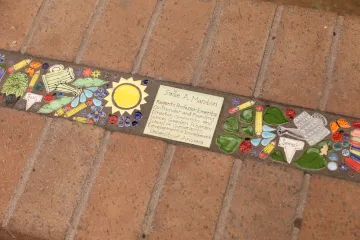
A segment of Sallie Marston’s bench showing crops to represent the Community and School Garden Program. Her bench also included images related to her research on the relationship between society and space, a picture of her dog, Edie, and a quote from Rosa Parks.
In his comments, Comrie focused on Marston’s scholarly contributions. “Sallie is really an academic rockstar. Her work on rethinking scale was nothing short of completely and utterly groundbreaking. She made this fundamental contribution to geography and, frankly, to all the social sciences.”
Marston said she was deeply honored to be acknowledged alongside the other recipients. “I am so proud to be up here with them and to join so many others who have been memorialized in the Women's Plaza of Honor. It is a great privilege to be part of this beautiful space.”
Marston also wanted to thank the “cast of hundreds” who have supported the Community and School Garden, especially the Haury Program.
“An early Haury small grant was followed by the prestigious Haury challenge grant, which helped us to develop a replicable model of a strong university-community partnership,” Marston said.
Karletta Chief and Toni Massaro
The other two bench recipients are also influential and inspiring women.
Karletta Chief is an associate professor in the Department of Environmental Science in the College of Agriculture and Life Sciences as well as the director of the Indigenous Resilience Center. Her research improves understanding of watersheds in arid environments and how Indigenous communities are affected by climate change.
Toni Massaro, Regents Professor, Milton O. Riepe Chair in Constitutional Law Emerita, and Dean Emerita in the James E Rogers College of Law, is the author of numerous law review publications and teaches constitutional law and freedom of expression. She is also the executive director of the Haury Program.
“The women honored here today have equipped a generation to carry on their good work,” said Thompson. “Through their own groundbreaking work and mentorship, they've ignited a wildfire of good work that can't be contained. And they're far from finished.”
Visit the Plaza to view the new benches and reflect upon the legacies of the outstanding women honored there.

